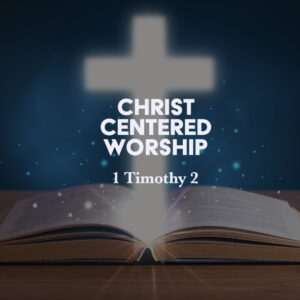1 Timothy 2: Christ Centered Worship
August 3, 2023
TODAY'S BIBLE READING:
Ezra 4-5, Proverbs 3, Luke 13:22-35, 1 Timothy 2

This chapter begins a section of Paul advising Timothy how he is to conduct worship in (as he calls it at the end of the section) “God’s household, which is the church of the living God, the pillar and foundation of the truth.” To put it in contemporary terms: how are we meant to do church? Paul gives clear and unequivocal answers. While he does not address every question that comes up in contemporary church, he gives principles which are meant to guide us and rule the church and its worship today: principles of biblical balance. What are they?
Paul begins with prayer. He tells Timothy that prayer should be made for everyone, even those in authority, kings (presidents and those in political power). This is for a particular purpose: that we may live peaceful lives in godliness and holiness, which pleases God who wants all people to be saved and come to a knowledge of the truth. In other words, Paul is asking that we pray that we live under the kind of secular authorities that allow the gospel to flourish in peace. How we need to pray for that today! As he talks about prayer, he wants men particularly to pray. For some reason, it is easy for men to think of prayer as somehow “unmanly” or not macho. But prayer is for men too, and Paul wants men to pray without anger or disputing. Put down your warring words and your warring deeds, and kneel together in unity in Christ and pray!
And then Paul comes to what – to us – seem some of the most controversial words he ever wrote! But rightly understood, Paul’s words are freeing, not demeaning. He says that women are to dress modestly. That does not mean boringly or blandly. It means, though, that women are not to attend worship wearing the kind of clothes that would be better worn at a party. Men also are not to flex their muscles to gain distracting attention away from the right focus which is God and his Word. And similarly, women are not to wear clothes that will draw the eye away from focusing upon God. So much of this is in the cultural details and in the balance and wisdom of the situation. What is appropriate to wear in England might be different from what is appropriate to wear in Africa from what is appropriate to wear in the Middle East from what is appropriate to wear in some parts of America. We need wisdom: but the principle behind what Paul is saying is that public worship is an exercise in the worship of God, not a chance to put on clothes that will draw attention to you (and away from God).
And then in this worship of God, there is a further distinction which – in this case – Paul deliberately roots not in culture but in creation, in the order of things as made by God before sin and the fall entered in, as well as in the impact of the fall upon the human race. This is not the place for an extended discussion of all the views there are about this text in the church, nor to exegete every fine detail of the Greek. In my view, Paul is saying that elders or overseers (see chapter 3) are to be qualified males only and that the place of authoritative teaching in the local church, the pulpit, is also to be occupied only by a qualified and God-called male too.
Finally, the most controversial statement that women will be saved through childbearing. What does Paul mean by this? Again there are many different views, and again this is not the place to explain all the different opinions nor exegete the Greek in fine detail. My own view on this is now distinctly unfashionable, but I have still yet to be persuaded of a better one! I think Paul is alluding to the pattern of salvation itself. If you go back to Genesis chapter 4, you see that when Cain was born, Eve it seems may have immediately thought that the promise that she would be the mother of what we would call the Messiah had already been fulfilled! Right from the beginning, the promise is that the child would come through a woman and save us all. And I think that in the pattern of child bearing, every mother bears that hope – either in prospect as they did in the Old Testament, or in retrospect as mothers do now. When we look on a newborn child, I think there is an intrinsic, instinctive resonance of hope that is not just “wow a baby,” but is related to the promise of God that there will be born of woman a Savior of the world. And I think what Paul is saying by this passage is, while of course this does not mean that a woman’s salvation is automatic (faith that leads to love and holiness is required), it does mean that a woman’s role in salvation and therefore spiritual matters is to be honored and respected, just as God himself honored a virgin’s womb.
To put it most briefly, the controversial parts of this passage are not controversial; when rightly understood and appreciated they are Christ centered, and most worshipful.
ABOUT THE AUTHOR
Josh Moody (Ph.D., University of Cambridge) is the senior pastor of College Church in Wheaton, IL., president and founder of God Centered Life Ministries, and author of several books including How the Bible Can Change Your Life and John 1-12 For You.
WANT MORE?
To receive God Centered Life devotionals directly in your inbox, as well as other resources, enter your email address in the form at the bottom of this page and click "subscribe."

